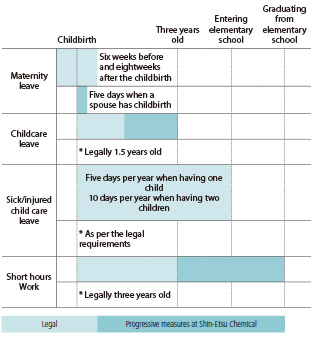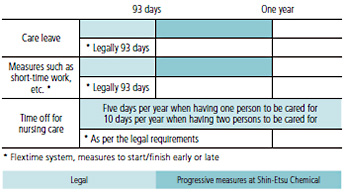Shin-Etsu Group Key CSR Issues
Shin-Etsu Group Key CSR Issues
Policy
Establishment of The Shin-Etsu Group Human Rights Policy
The Shin-Etsu Group has been engaged in business activities based on an ongoing respect for human rights at all its business sites around the world. The Company's commitment to respecting human rights is outlined in The Shin-EtsuGroup Human Rights Policy, which is to be painstakingly implemented in the Group and communicated outside the Company.
The Shin-Etsu Group Human Rights Policy
Shin-Etsu Group (the "Group") engages in business based on its Business Principle, "The Group strictly complies with all laws and regulations, conducts fair business practices and contributes to people's daily lives as well as to the advance of industry and society by creating value through the provision of key materials and technologies." The foundation of this is respect for human rights. The Group respects the human rights of all individuals. All our Group companies worldwide respect human rights perpetually in accordance with the international code of conduct1 and actively promote the following actions to respect human rights.
Respect for Human Rights
1. Prohibition of discrimination
We do not discriminate at all on the basis of nationality, race, ethnicity, gender, religion, personal views, beliefs, age, social status, disability, sexual orientation, gender identification, labor union participation, health, marital status, political opinion, or any other status.
2. Prohibition of damaging human dignity
We do not in any case conduct sexual harassment, power harassment, maternity harassment or any other acts that damage human dignity.
3. Protection of privacy
We protect the privacy of individuals and handle personal information properly in accordance with the applicable laws and regulations of each country.
4. Respect for basic labor rights
We respect the workers' right to organize, the right of collective bargaining, and further rights given to workers to establish, maintain, and improve trust and good cooperative relationships through dialogue between labor and management.
5. Prohibition of child labor and forced labor
- 1 "International code of conduct" follows:
The Universal Declaration of Human Rights, ILO International Labour Standards, UN Guiding Principles on Business and Human Rights, UN Global Compact's 10 Principles, etc.
Activities for Respecting Human Rights
1. Human rights awareness
The people responsible for human resources in each business site and company of the Group will strive to develop the proper understanding of human rights and awareness of respect for human rights through activities including education for employees on human rights.
2. Human resources development
The Group will create an environment in which diverse individuals can work at their full capacity and equally give all employees opportunities aligned with their aptitudes to develop and utilize their abilities.
3. Working environment
The Group will make efforts to create a sound and comfortable working environment and to ensure safety.
4. Prevention of human rights infringement
The Group will make efforts to prevent the infringement of human rights in the course of business activities by conducting human rights due diligence1 in accordance with the UN Guiding Principles on Business and Human Rights.
5. Measures for handling issues
If there are concerns regarding human rights infringement in our business activities, the Group will take appropriate measures promptly to resolve them.
6. Promotion of respect for human rights
- 1 "Human rights due diligence" means:
To regularly implement the identification, evaluation, preventative/corrective measures, investigation, monitoring, and information disclosure of human rights risks in accordance with the Group's human rights policy.
Established on May 21, 2019
Respect for Human Rights
Observance of International Labor Standards
The Group respects the human rights of employees in accordance with the international labor standards through the International Labour Organization (ILO), and never discriminates employees on the basis of race, age, gender, sexual orientation, ethnic or national origin, disabilities or religion.
To this end, the Company confirms with its consolidated companies every year whether respect of human rights, labor management, and employment are being appropriately implemented following laws and regulations in their respective countries and regions. In addition, when building a new plant, its impact on the region in terms of human rights is taken into consideration.
Confirmation Items concerning Respecting Human Rights
Prohibition of child labor, proper working hours, decent wages, proper employment contract in writing, prohibition of inhuman treatment, prohibition of discrimination, freedom of association
Efforts for human rights awareness
The Group has established a Human Rights Enlightenment Promotion Committee. This committee holds regular human rights awareness training for directors and employees. Human rights Q & A are serialized in our internal company newspaper, and we compile a human rights enlightenment motto to coincide with our annual human rights week in December.
Furthermore, the Company has been a member of both the Tokyo Industrial Federation for Human Rights and the Osaka Dowa / Human Rights Issues Industrial Federation and participates proactively in events held by both federations as well as training sessions held by administrative organizations.
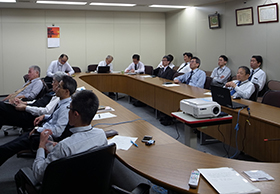
Human rights awareness training (January 2019, Shin-Etsu Chemical Osaka Branch)
Education/Training and Personal Development
The Group supports employees to grow through various training systems. The training system has training for different staff grades, global communication training, auditing student system, environmental education, safety education and mental health education.
Global communication training
The Group is expanding its business activities throughout the world. Competency to communicate in foreign languages is therefore an essential skill for smooth operations. Therefore, the Company offers the following kinds of training.
- - English language training (meeting skills course and presentation skills course)
- - Cross-cultural communication training
Auditing student system for employees
In 1962, the Company established an auditing student system for employees. Under the learning system with the goal of improving the workforce, up to about ten operators at manufacturing sites of the Group each year are chosen and sent to study at universities for one year. In the 56 years since the system was introduced, a total of 536 employees have completed the program and are now functioning in various workplaces.
Training system list
Continuing Chinese languages classes
Du Yan, lecturer in Chinese
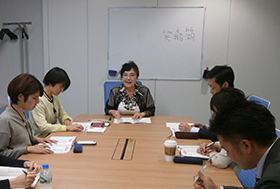
Chinese languages classes (May 2018, Shin-Etsu Chemical Head Office)
I have been in charge of Chinese-language classes at Shin-Etsu Chemical since about 20 years ago. At first, these classes were like an association of those who liked to study the language, and I taught language useful for travel and other things, such as about the history and culture of China and the disposition of Chinese people. But since four years ago, I have emphasized students' efforts to pursue their studies and reviewed the content of classes so that the language could be used for daily operations. The students are enthusiastic about learning Chinese, and some of them have passed the Chinese Proficiency Test. Recently, one student reported, "I was able to exchange emails with business partners in Chinese," and another said, "I was able to talk directly with people at the company I visited on a business trip, and the negotiations went well." I am very happy to receive such reports.
I will strive to teach Chinese in an easy-to-understand way so that students can use it effectively.
Performance-based Personnel Evaluation Systems and Equal Opportunities
The Group has introduced an employee evaluation system that emphasizes employee ability and work performance. This system is working for improving employees' motivation, as their treatment reflects their performance, attitude, and evaluations of how they meet their challenges to achieve higher goals.
To operate the personnel system in a fair and appropriate manner, evaluation training is provided for all managers who conduct performance review so that they can carry out personnel evaluations in a fair way.
Transparency is increased by making evaluation standards available and disclosing the results. In addition, there is a system of interviews between an evaluator and the person who is evaluated to ensure that they can communicate successfully.
During interviews, each staff member and his/her immediate supervisor are using Communication Sheets to ensure mutual awareness of the supervisor's expectations and are setting half-year goals. Furthermore, feedback on progress is given for further ability development.
Promotion of Diversity
Active promotion of diverse human resources
As a group engaged in business operations around the world, the Group hires local employees at overseas group companies and hires foreign nationals in Japan.
The entire Group is also working to proactively employ people with disabilities and create environments where it is easy for them to work.
Furthermore, in order to promote women's participation and advancement, the Group has set a goal of 5 years from FY 2016 and is working on it. In FY2018, we achieved the target number of female managers.
Goals to promote women's participation and advancement
In the next five years from FY2016, the Company will target that:
- 1. The rate of hiring women is 40% for administrative positions and 10% for engineering positions.
- 2. The number of women in managerial positions including junior manager level will be doubled compared to the number in FY2014.
Changes in the number of female managers compared to the 2014 level
| April 2017 | April 2018 | April 2019 |
|---|---|---|
| Approx.150% | Approx.170% | Approx.220% |
Raising retirement age
In April 2019, the Company raised the retirement age from 60 to 65 after continuing discussions with the Shin-Etsu Chemical Labor Union. It is the first system at a major Japanese chemical company. After age 60, 80% of salary at age 59 will be paid. In addition, raising and promotion based on personnel evaluation will also be implemented.
By adjusting the employment environment after the age of 60, skilled workers at manufacturing sites will be able to pass on the technology and experience to the next generation.
Employment Rate of Persons with Disabilities
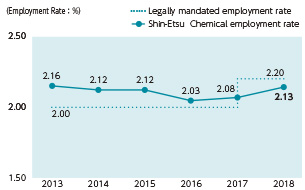
- * The legally mandated employment rate has been 2.2% since April 2018.

Wheelchair Ramps (Shin-Etsu Chemical Gunma Complex)
System for work-life balance
Childcare support system
The Group supports employees having and raising children. The Company has published the Childbirth and Child Care Guidebook, which summarizes the governmental systems and procedures related to childbirth and child care. Employees can use the Company's childcare leave system for children up to three years old. About 40 employees on average use the childcare leave system in the Company and consolidated companies in Japan. In addition, employees can use the shorter working hour system and shorten their working hours for a maximum of two hours a day. This system can be used until children graduate from elementary school. Furthermore, three days of paid leave are granted when a spouse delivers a child.
Childcare is supported according to local laws and regulations in overseas Group companies.
Main system for childcare support (Shin-Etsu Chemical)
* Since October 2017, employees can take child care leave until their child becomes aged two, if they meet certain conditions.
Number of Employees Who have Taken Childcare Leave
| FY2014 | FY2015 | FY2016 | FY2017 | FY2018 | ||||||
|---|---|---|---|---|---|---|---|---|---|---|
| Male | Female | Male | Female | Male | Female | Male | Female | Male | Female | |
| Shin-Etsu Chemical (Non‒consolidated) |
2 | 8 | 0 | 6 | 0 | 9 | 0 | 8 | 0 | 11 |
| Consolidated in Japan | 5 | 52 | 2 | 42 | 0 | 44 | 0 | 39 | 1 | 35 |
| Consolidated | 56 | 86 | 44 | 73 | 68 | 72 | 77 | 69 | 90 | 100 |
- * The length of childcare leave differs from country to country, as the program is based on local law.
Nursing care leave system
The Group has a nursing care leave system as shown in the chart on the right. The system enables employees to work in the Company while caring for elders.
The Nursing Care Guidebook is issued in which all the necessary information on our nursing care system and care insurance is provided. Furthermore, we started "health care and nursing support" services in FY2014 and provide counseling by external experts.
Main system for the care system (Shin-Etsu Chemical)
Number of people obtaining nursing care leave
| FY2014 | FY2015 | FY2016 | FY2017 | FY2018 | |
|---|---|---|---|---|---|
| Consolidated in Japan | 3 | 3 | 1 | 2 | 0 |
Welfare and Benefits
Saved holidays system
If a certain number of annual paid holidays granted in accordance with labor regulations have expired without being taken, a certain number of days can be treated as saved holidays. Employees may use these saved holidays for nursing care, for injury or illness, for volunteer work for regional disasters or for donating organs or bone marrow transplants.
Counseling hot line for employees
As a counseling service for trouble with work or other issues, we have set up Dial Shin-Etsu, which is staffed by external counselors who are specialists from outside of the Company. Consultations are received anonymously and treated with strict confidentiality, but if requested by the consulter, the counselor will contact the Personnel and Labor Relations Department to discuss possible solutions.
Shinkansen commuting allowance system
Since 1989, the Group has allowed commuting by Shinkansen at company expense. This system is promoting more employees to own houses. It also enables personnel who are reassigned to head office from plants and other business sites in Gunma and Fukushima prefectures to transfer to jobs in Tokyo without changing their lifestyles. As of March 2018, 77 employees use this system.
Other systems
The Dr. Kanagawa scholarship was established in June 2012 for employees to study at St. Clark State College in Washington, USA for one year. This scholarship was enabled due to the trusting relationship which was built over many years between the College and our Chairman, Dr. Kanagawa.
In addition, we have established asset-building schemes, an employee shareholding system, and a mutual aid society to provide support for weddings, childbirth, and sudden hospitalization of family members.
Welfare and benefits facilities
We have dormitories and company housing near the head office and plants for employees who live outside the commuting area. We also have directly operated recreational facilities in Kanagawa, Shizuoka, Fukushima and Niigata prefectures. The Group's employees can use these facilities with family and friends. Furthermore, we have partnerships with external recreational facilities, and subsidies are given to the users.
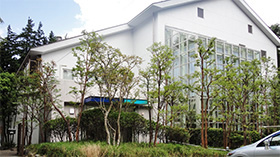
Shin-Etsu Chemical Hakone Shinsensou (Kanagawa prefecture)
Labor-management Relations
The Company engages in various dialogues with the Shin-Etsu Chemical Labor Union to promote mutual understanding between labor and management. The Central Labor-Management Meeting is held once a month at the head office attended by top management. They engage in thorough discussions with labor union regarding subjects such as management policy, and outline information about individual businesses, and the personnel system. Also, each business site holds a monthly Local Labor Meeting with the local branch of the Shin-Etsu Chemical Labor Union.
Repeated dialogues and discussions between labor and management deepen mutual understanding and trust and facilitate the expansion of business operations in which staff and management can come together to carry out speedy responses to the changing business environment.
- * Personnel subject to CSR Key Issue 5 in the Shin-Etsu Group are the employees of and loaned employees from Shin-Etsu Chemical.





